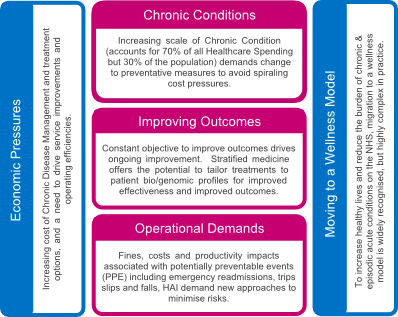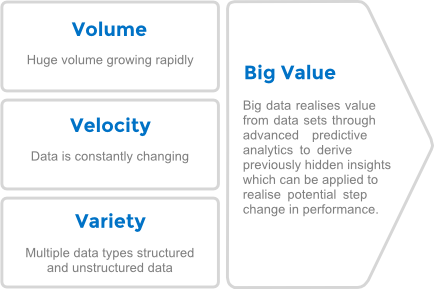Copyright © LBDC -
Liverpool Big Data Collaboration
C/O Royal Liverpool & Broadgreen University Hospitals Trust
Prescot Street
Liverpool
L7 8XP
Details

Quick Actions
Collaboration partners
Site Links

Big Data in Healthcare
You are here: home > big data in health
Big Data has become big news through its potential to provide hitherto hidden insights which can be applied to enable significant improvements in performance.
In healthcare big data can be used in multiple situations from pure research insight, through to production scale use cases in clinical practice and operational management. However, the term big data also causes confusion between management of ever larger data as opposed to the true meaning of big data enabled predictive analytics. In this section we seek to address three questions:
- Why apply big data in healthcare?
- What is big data?
- What are the challenges in realising the potential?
In healthcare, big data offers the potential to help address some of the key challenges facing the NHS from operational economic pressures, though the challenges associated with increasing chronic conditions and ultimately the progression towards personalised medicine and a wellness (rather than sickness) model of healthcare.
Big data can, in particular, be used to derive probable patient outcomes based on a comprehensive predictive analysis based on the available data sets. By readily identifying the causal factors through the analytics, interventions can be taken to reduce the risks of undesirable outcomes or increase the probability of favourable outcomes. Such capability readily aligns with support for chronic condition management and risk avoidance, but can also be applied to operational situations such as the risks of readmissions or healthcare associated infection (HCAI) for example.
WHY APPLY BIG DATA IN HEALTHCARE?
Big Data offers the potential to help address some of the key challenges facing the NHS
Staggeringly 90% of all data in existence today was created in the last two years and every two days we create as much data as we as did from the beginning of time until 2003. These are sobering statistics, but despite the term, big data, is not simply about working with ever larger data sets. True big data is about being able to use the data sets we have to infer insight through advanced predictive analytics which identify data correlations which with scale and complex data interrelations can provide robust insight which couldn’t otherwise be derived in a useable manner. It it the value that can be derived through the application of this insight which can provide new opportunities for performance improvement across multiple fields, and it is for these reasons that big data has become such big news.
The big data ‘revolution’ is enabled by the latest data science/analytics capabilities and the availability of diverse datasets, but is driven by the value or benefit the insights can provide.
Applicable data sets can be characterised by their volume, velocity and variety with both structured (eg data generated by traditional database systems) and unstructured data (ie images, scans, letters and more) to be included in analysis and modelling.
The inferred insight can then be beneficially applied in operational, clinical and
research settings. Learn more about these use cases situations or research applications
on the use-
WHAT IS BIG DATA?
Big Data is not just about ever larger data sets
The potential of big data is hugely compelling but there are also considerable challenges involved in enabling and applying the capability, each directly addressed by the LBDC strategy. The principal challenges are highlighted below:
WHAT ARE THE CHALLENGES IN REALISING THE POTENTIAL?
Big Data offers huge potential but there are significant challenges involved
Data infrastructure
Data science capability
Accessing data sets
Strategy & programme




Funding & incubation
Research engagement
Use-
Governance & mgt









